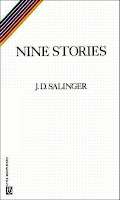
It seems only fitting to begin this month’s edition of Six Degrees of the Library Collection with J.D. Salinger. The author – most famously of the coming of age classic The Catcher in the Rye – died in late January at the age of 91. Known as much in the last 50 years for his reclusive lifestyle as for his earlier literary output, it seems interesting to see how we can connect this author to others in our library collection.
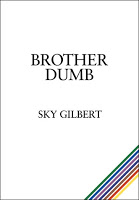 The first book that comes to mind is one that I’ve seen in the library a number of times, but never really investigated. It’s the cover that makes you do a double take, as it very consciously mimics the cover style of the Little, Brown mass market paperback editions of Salinger’s works. Brother Dumb by Sky Gilbert is described as “a fictionalized memoir of an American literary icon who withdraws from the public sphere”. Gilbert is a Canadian author who is primarily known as a playwright but has written a few novels. One of his novels An English Gentleman won the 2005 ReLit award for novel.
The first book that comes to mind is one that I’ve seen in the library a number of times, but never really investigated. It’s the cover that makes you do a double take, as it very consciously mimics the cover style of the Little, Brown mass market paperback editions of Salinger’s works. Brother Dumb by Sky Gilbert is described as “a fictionalized memoir of an American literary icon who withdraws from the public sphere”. Gilbert is a Canadian author who is primarily known as a playwright but has written a few novels. One of his novels An English Gentleman won the 2005 ReLit award for novel.
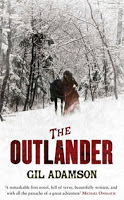 The ReLit Awards were set up in 2000 to recognize great Canadian writing published by independent presses. (We did a post about the 2009 winners back in September). They have developed from a relatively small prize to one that is gaining a lot of critical attention – but not one which awards winners any money (they do get a really cool ring though). Another past winner of the ReLit Award for novel is Gil Adamson, who’s 2007 novel The Outlander tells the story of a young widow (who herself is the cause of her husband’s death) and her journey from the law across the Canadian west in the early 20th century. It was a contender for last year’s CBC Canada Reads competition.
The ReLit Awards were set up in 2000 to recognize great Canadian writing published by independent presses. (We did a post about the 2009 winners back in September). They have developed from a relatively small prize to one that is gaining a lot of critical attention – but not one which awards winners any money (they do get a really cool ring though). Another past winner of the ReLit Award for novel is Gil Adamson, who’s 2007 novel The Outlander tells the story of a young widow (who herself is the cause of her husband’s death) and her journey from the law across the Canadian west in the early 20th century. It was a contender for last year’s CBC Canada Reads competition.
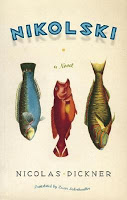 This year’s Canada Reads competition hits the airwaves this coming March and the 5 selected titles up for debate were announced late last year. Pretty quickly after the announcement, a number of sources noted that this year’s contenders are all relatively well known Canadian novels which have already won major awards or notoriety. Is that a problem? Personally, I’m not sure it is, but the National Post’s book blog The Afterword seemed to think so. They set up a shadow shadow competition called Canada Also Reads to highlight the “unknown or under-appreciated” sort of book they like to see championed on Canada Reads. Their assessment of this year’s Canada Reads’ picks was that they contained only one such title: Nikolski by Nicolas Dickner.
This year’s Canada Reads competition hits the airwaves this coming March and the 5 selected titles up for debate were announced late last year. Pretty quickly after the announcement, a number of sources noted that this year’s contenders are all relatively well known Canadian novels which have already won major awards or notoriety. Is that a problem? Personally, I’m not sure it is, but the National Post’s book blog The Afterword seemed to think so. They set up a shadow shadow competition called Canada Also Reads to highlight the “unknown or under-appreciated” sort of book they like to see championed on Canada Reads. Their assessment of this year’s Canada Reads’ picks was that they contained only one such title: Nikolski by Nicolas Dickner.
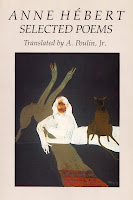 French Canada might not agree with The Afterword’s opinion that Nikolski is not well known: the French edition won several major book prizes and the English edition was awarded a Governor General’s Award for Translation. Whether you’ve heard of it already or not, Nikolski is a quirky, modern tale of three young Canadians whose lives intersect in strange and wonderful ways and who all find themselves at some point living in Montreal. Among the French language awards it won was the Prix Anne-Hébert.
French Canada might not agree with The Afterword’s opinion that Nikolski is not well known: the French edition won several major book prizes and the English edition was awarded a Governor General’s Award for Translation. Whether you’ve heard of it already or not, Nikolski is a quirky, modern tale of three young Canadians whose lives intersect in strange and wonderful ways and who all find themselves at some point living in Montreal. Among the French language awards it won was the Prix Anne-Hébert.
The Prix Anne-Hébert is named after (unsurprisingly): Anne Hébert, a talented and prolific Quebecois writer. Hébert won three Governor General’s Literary awards – two for fiction, one for poetry. Hébert who grew up in Quebec, later moved to France, is remembered in part for the depictions of rural Quebec in her writing. She was also considered a pioneer for women writers in Canada, creating strong female characters in many of her books. Hébert died in 2000 in Montreal.
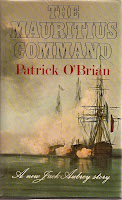 Another well known, well loved author who passed away in 2000 was British novelist Patrick O’Brian. O’Brian is probably best known for his Aubrey-Maturin series of historical fiction of the high seas, which follow the 19th century adventures of a sea captain and a surgeon in the Royal Navy. The series was the inspiration for the 2003 blockbuster film Master and Commander: the far side of the world.
Another well known, well loved author who passed away in 2000 was British novelist Patrick O’Brian. O’Brian is probably best known for his Aubrey-Maturin series of historical fiction of the high seas, which follow the 19th century adventures of a sea captain and a surgeon in the Royal Navy. The series was the inspiration for the 2003 blockbuster film Master and Commander: the far side of the world.
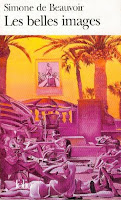
What is perhaps less know about O’Brian, however, is that he was also fluent in French and translated a number of works from French into English, including several works of Simone de Beauvoir. The library owns a number of these translations, including the novel Les Belles Images and the memoirs A Very Easy Death and Adieux: a farewell to Sartre.
(Oh, and an aside – did you know that we actually started another Six Degrees of the Library Collection post with Salinger last year? The starting point might have been the same – but the directions were totally different…)



